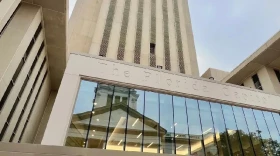With images and videos from protests dominating headlines and social media feeds, it can be difficult for adults to navigate their own feelings during this time of civil unrest, much less explain what's going on to their children.
WGCU’s Andrea Perdomo spoke with Florida Gulf Coast University’s Director of Community Counseling Center, Alise Bartley, about how parents can talk to their children during the wave of protests sweeping the country and the world.
Here is a transcription of their conversation:
Perdomo:
So these are some pretty strange times, you know, between a public health crisis, and now the civil unrest that's kind of taking hold of the country. If adults might be having a hard time processing all this, how might children be impacted?
Bartley:
Well, children are impacted at a different level than adults. Adults are able to think abstractly as to what this means, children can only think concretely. Which means all they're seeing are that people are getting hurt, and that people are very angry. They are really struggling with what the bigger picture of the writing and the protesting means.
Perdomo:
And can you elaborate on how children are being exposed to news more than they might have been before?
Bartley:
Because of all the schoolwork that's happening, our children do have an incredible amount of access to technology and a lot of media, whether it's mass media or social media, they have more access than they've ever had in any time of our history. And because of that, it's very difficult for parents to be able to monitor everything our children are watching. So our children are being exposed to some very disturbing images that can really negatively impact some children and adolescents.
Perdomo:
What can parents who are feeling anxious do during this time?
Bartley:
So I would encourage if you as a parent are experiencing symptoms related to anxiety or feeling really unsettled, that you limit the amount of exposure you have to the media.
Perdomo:
So parents should not only limit their children's access, but should also be mindful of of their screentime as well?
Bartley:
Absolutely, because we're really struggling with [not] having the face to face contact, due to the physical distancing that we have from people. We are socially connecting through a lot of different mediums. And we may think our children are not listening because they're playing a video game or they're doing something else--trust me, our children hear everything that we have to say. And they're also listening to the TV, if the TV's on or we're on our computers, and we're looking at a site about the protesting, our children are very much aware of what's happening.
Perdomo:
And how should parents address sensitive topics like racism and police brutality with their children?
Bartley:
I think it's very important to base this on the age and the developmental phase of each of our children. So, if you have a young child at home, who's less than at the age of six, I would discourage any type of contact in regards to what's happening with the social media. I think it is important that we have a discussion how we need to be respectful and treat everyone respectfully no matter who they are, or what culture or race that they're from. I think as we get older, and our teenagers in particular are feeling a sense of outrage as to what's happening, this is where you need to work with your teenager to empower them to channel their frustrations into something that can really accurately reflect their personal integrity and their goals. So, maybe it's writing your member of Congress, or if you have someone who's going to be turning 18, making certain that they vote. So it's really based on the developmental stage and what's happening with them personally.
Perdomo:
What can parents do to get a conversation started with their children to find out how they are thinking and feeling as they hear the news and see these images from protests? Is it important to talk to them about these things?
Bartley:
Absolutely. And our children need to be informed about the protesting and the rioting. Again, you have to decide based on each developmental phase what level of exposure you want to have with your children. Again, younger than six I would definitely limit the amount of exposure but when it comes to six and above, and again, it depends on the developmental savviness of your child, I would ask ‘well, what do you know right now? What have you heard?’ And this is where it's important as parents, we do our best to reassure our children that we're going to do everything that we can to keep them safe, and to talk about how we are supposed to treat each other, how important it is that we treat everyone with respect and dignity.
Perdomo:
What can parents do to help their children deal with anxious feelings?
Bartley:
And again, there's such a developmental difference between all these different age kids. If your children are really struggling, one of the best things we can do is breathe with them, and to teach them how to breathe in a way that is cleansing and just focusing in on the breath. And there are many great apps out there that could help you based on the developmental stage your child is in to do some breathing. But I think the most important thing we need to do as parents is to model the appropriate behavior. If we are responding in fear, our children are going to read that fear. For a lot of our children, some of these anxious feelings and unsettling feelings are going to pass, for other children, they're going to be greatly impacted by this. So, it's going to be important that if they are greatly impacted, that you make an appointment with a counselor so that you can go through how they're feeling, and we can help them with some other coping skills.
Perdomo:
It's hard to discuss issues like racism and police brutality with adults. I can't even begin to imagine how I would explain them to children.
Bartley:
I agree with you, Andrea, it is hard to find the right words. I think the most important thing to say is that right now, we're trying to figure out how to be certain that we treat everyone with respect and dignity. And at this point, this has not happened in our society, and we want to be certain that everyone has the same rights.





